|
|
|
Sort Order |
|
|
|
Items / Page
|
|
|
|
|
|
|
| Srl | Item |
| 1 |
ID:
128467
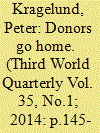

|
|
|
|
|
| Publication |
2014.
|
| Summary/Abstract |
The international development arena is currently subject to major changes in the geographies of power. In this article I analyse how and to what extent the (re)entry on the development scene of China, India and Brazil, together with increasing prices for primary commodities and improved access to international finance, has affected Zambia's political leverage to set, implement and fund its own developmental policies. I argue that, while real changes in external financial flows comparable to aid from these non-traditional state actors are still small, these actors' experience is providing Zambia with an alternative development model that combines purposive state intervention with market-based economic growth and integration into world markets. While Zambia may be taking the first steps in strengthening its 'sovereign frontier', the extent of this movement is still small and its development outcomes are far from assured.
|
|
|
|
|
|
|
|
|
|
|
|
|
|
|
|
| 2 |
ID:
153904
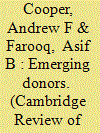

|
|
|
|
|
| Summary/Abstract |
This paper examines the evolving pattern of democracy promotion by three emerging donors: India, Brazil and South Africa. It first asks how the emerging donors promote democracy through their development assistance. The paper argues that despite the risk of compromising security and trade interests, the emerging donors have adapted to a 2 × 2 (two by two) model of democracy promotion by which they circumvent risk by promoting procedural democracy through bilateral means and non-procedural democracy through multilateral frameworks. Second, the paper asks why these three countries exhibit the same pattern of democracy promotion in spite of not having coordination among them. In response, the paper provides a structure–agent explanation. The paper contends that the structural constraints imposed on emerging donors are conducive to the operation of the 2 × 2 model in promoting democracy. While the model safeguards the emerging donors from criticism of being undue interveners in other countries' domestic affairs, it also privileges them with international recognition for being responsible partners in democracy promotion.
|
|
|
|
|
|
|
|
|
|
|
|
|
|
|
|
| 3 |
ID:
143628
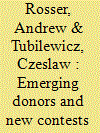

|
|
|
|
|
| Summary/Abstract |
The rise of emerging donors has unleashed new political contests over aid policy, some of which have occurred at the domestic level. This article locates the special edition's analysis of these contests within the existing literature on emerging donors, draws out the key findings of included papers, and considers their implications for policy. It argues that domestic contests have had significant influence over aid policy in both emerging and established donors, the agendas at work have varied from case to case reflecting countries' different political economies, and aid policies represent a ‘work-in-progress’ rather than an expression of immutable models.
|
|
|
|
|
|
|
|
|
|
|
|
|
|
|
|
| 4 |
ID:
174562
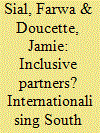

|
|
|
|
|
| Summary/Abstract |
In recent years, non-traditional or ‘emerging’ donors such as South Korea have organised their development cooperation models in a manner that seeks to complement the capacities of the private sector by extending the overseas activities of domestic businesses. To better understand this process, this article examines the role of South Korea’s large, family-led conglomerates (chaebol) in its growing international development sector. In particular, we focus on how the concept of corporate social responsibility (CSR) has been used to link the role of its large, and frequently scandal-ridden, private companies to international development, and, by extension, how it has helped to internationalise state–business networks long associated with the Korean developmental state. We examine two strategies through which this has been carried out. The first is by extending the logic of creating shared value (CSV, a derivative of CSR) to aid and infrastructure projects in which chaebol and other state-linked businesses have participated. The second is by directly embedding CSR-based aid initiatives in the value chains of the specific chaebol themselves.
|
|
|
|
|
|
|
|
|
|
|
|
|
|
|
|
| 5 |
ID:
118662


|
|
|
|
|
| Publication |
2012.
|
| Summary/Abstract |
In recent years a number of countries have established more prominent development assistance programmes. These 'emerging donors' are generally low- and middle-income countries with fewer links than traditional donors to multilateral frameworks for coordination. This article focuses primarily on whether these increasingly important donors will converge upon or challenge the behavioural norms that have emerged from traditional donor operations. It offers two main findings. First, although the evidence is incomplete, it suggests that the group of emerging donors is too heterogeneous to pose a collective alternative to the existing aid architecture, though these states may well provide new insights to enrich and improve our understanding and practice of development assistance. Second, it suggests that the case of Russia as a re-emerging donor highlights the conceptual weaknesses of theorizing simply in terms of 'emerging donors' versus 'traditional donors'.
|
|
|
|
|
|
|
|
|
|
|
|
|
|
|
|
| 6 |
ID:
147426
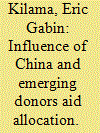

|
|
|
|
|
| Summary/Abstract |
From the perspective of recipients, the increasing influence of China and emerging donors in the aid landscape represents an opportunity to attract additional resources to finance development and improve their control over their development agenda. This paper investigates how African countries and other LMICs deal with this complex and changing aid landscape and explores how government fiscal behaviors and private agent anticipations regarding aid flows are affected.
We used several measures of fiscal behaviors and we were not able to confirm empirically the fear of traditional donors about a macroeconomic disaster that would follow emerging donors aid allocation. Moreover, the results indicate that economies receiving additional aid flows from China enhance their fiscal response to aid through an increased domestic economy aid absorption rate.
|
|
|
|
|
|
|
|
|
|
|
|
|
|
|
|
|
|
|
|
|